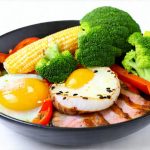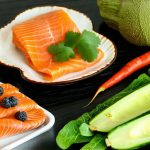Gastroesophageal Reflux Disease (GERD) impacts millions, manifesting as heartburn, regurgitation, and discomfort after eating. Managing GERD often requires lifestyle adjustments, with diet playing a pivotal role. It’s not about strict deprivation; it’s about informed food choices that minimize acid reflux triggers and support digestive health. Many people find relief simply by understanding which foods exacerbate their symptoms and building a meal plan around gentler alternatives. This article aims to provide a practical guide to creating a GERD-friendly weekly meal plan, emphasizing sustainable dietary habits rather than temporary fixes.
The key isn’t necessarily eliminating entire food groups (though some may need to be limited individually), but rather understanding portion sizes, cooking methods, and timing of meals. A well-structured plan takes the guesswork out of eating, reducing anxiety around potential flare-ups and promoting consistent digestive comfort. It’s important to remember that GERD is highly individual; what triggers one person might not affect another. Therefore, maintaining a food diary alongside implementing these suggestions can help identify your specific sensitivities and tailor your meal plan accordingly. This isn’t about restriction; it’s about empowerment through knowledge. Perhaps starting with gut safe meal habits could ease you into the process.
Understanding the Dietary Triggers of GERD
Certain foods are notorious for triggering GERD symptoms because they either directly increase stomach acid production, relax the lower esophageal sphincter (LES) – the muscle that prevents stomach acid from flowing back up into the esophagus – or take longer to digest, increasing pressure in the stomach. Common culprits include: – Fatty Foods: These slow down digestion and can cause the LES to relax. – Spicy Foods: Capsaicin, found in chili peppers, can irritate the esophageal lining and increase acid production. – Acidic Foods: Citrus fruits, tomatoes, and vinegar-based dressings can directly aggravate the esophagus. – Chocolate: Contains compounds that relax the LES. – Caffeine & Alcohol: Both can weaken the LES. – Carbonated Beverages: Introduce gas into the stomach, increasing pressure. – Peppermint & Spearmint: Surprisingly, these can also relax the LES in some individuals.
It’s vital to note that this isn’t a ‘one-size-fits-all’ list. Some individuals may be able to tolerate small amounts of trigger foods without issue, while others might need to avoid them completely. Pay attention to your body and adjust accordingly. Focusing on what you can eat is often more productive than fixating on restrictions. Many delicious and nutritious options remain available even with dietary modifications. For some, a gut-friendly meal plan might provide additional relief.
The timing and manner in which we consume food also significantly impact GERD symptoms. Eating large meals, especially right before bedtime, increases the risk of reflux. Similarly, eating quickly without proper chewing can overload the digestive system. Prioritizing smaller, more frequent meals throughout the day is generally preferable to three large ones. This reduces stomach pressure and allows for better digestion. Slowing down during mealtimes and thoroughly chewing food are also crucial steps in minimizing GERD symptoms.
Building a Weekly Meal Plan Framework
Creating a successful GERD-friendly meal plan begins with establishing a solid framework. Start by identifying your baseline – what you currently eat. Then, gradually incorporate changes based on the dietary triggers discussed earlier. This phased approach is less overwhelming and more sustainable than attempting drastic alterations overnight. A sample weekly structure could look like this: – Breakfast: Oatmeal with banana and almond milk; Scrambled eggs (cooked with minimal fat) and whole-wheat toast. – Lunch: Grilled chicken salad (using romaine lettuce, cucumber, and a light vinaigrette); Turkey breast sandwich on whole-grain bread with avocado. – Dinner: Baked salmon with roasted sweet potatoes and steamed green beans; Lean ground turkey stir-fry with brown rice and vegetables. – Snacks: A handful of almonds; Plain yogurt with berries; Rice cakes with peanut butter.
This is merely a starting point, of course. Personalize it to your preferences and dietary needs. Variety is key to maintaining interest and ensuring you receive adequate nutrients. Don’t be afraid to experiment with different recipes and ingredients within the guidelines of GERD-friendly eating. The goal is to create a plan that feels manageable and enjoyable, not restrictive and burdensome. You might also consider starting a gut health routine alongside these dietary changes for holistic wellness.
Consider incorporating meal prepping into your routine. Preparing components of meals in advance – chopping vegetables, cooking grains, or portioning out snacks – can save time during busy weeks and reduce the temptation to grab less healthy options. This proactive approach helps you stay on track with your GERD-friendly goals. Consistency is paramount. For a more structured approach, explore minimal ingredient meal plans.
Sample Meal Ideas & Recipes
Let’s delve into some specific meal ideas that are typically well-tolerated by individuals with GERD. Breakfast options often benefit from being bland and low in fat. Oatmeal, prepared with water or almond milk (avoiding dairy if it’s a trigger), is an excellent choice. Adding sliced banana or berries provides natural sweetness and fiber. Scrambled eggs, cooked with minimal oil or butter, are another good option. Avoid adding spicy seasonings or excessive amounts of cheese. For lunch, lean protein sources like grilled chicken or turkey breast paired with non-acidic vegetables (cucumber, romaine lettuce, spinach) and whole grains offer a balanced meal.
Dinner can be equally satisfying without triggering reflux. Baked fish – salmon, cod, or halibut – is rich in omega-3 fatty acids and easy to digest. Pair it with roasted sweet potatoes (a lower-acid alternative to regular potatoes) and steamed green beans or broccoli. Stir-fries using lean ground turkey or chicken and plenty of vegetables are also excellent choices. Use a low-sodium soy sauce or tamari for flavoring, and avoid adding spicy peppers or excessive oil. Snacking should focus on small portions of easily digestible foods. A handful of almonds provides healthy fats and protein, while plain yogurt with berries offers calcium and antioxidants. Rice cakes with peanut butter offer a satisfying crunch and sustained energy. Building a liver-friendly meal plan could also support overall digestive function.
Lifestyle Integration & Long-Term Management
A GERD-friendly meal plan is just one piece of the puzzle. Integrating other lifestyle adjustments can significantly enhance its effectiveness. Maintaining a healthy weight is crucial, as excess weight puts pressure on the abdomen and increases the risk of reflux. Regular exercise promotes digestive health and reduces stress, which can also contribute to GERD symptoms. Elevating the head of your bed by 6-8 inches while sleeping can help prevent nighttime reflux.
Avoid eating within 2-3 hours of bedtime. This allows sufficient time for digestion before lying down. Wear loose-fitting clothing that doesn’t constrict the abdomen. Manage stress levels through techniques like yoga, meditation, or deep breathing exercises. Consider keeping a food diary to identify your personal triggers and adjust your meal plan accordingly. This ongoing process of self-awareness is essential for long-term management. A gut recovery meal plan can be beneficial if you’re experiencing significant digestive distress.
Finally, remember that this information is not intended as medical advice. If you are experiencing persistent GERD symptoms, it’s crucial to consult with a healthcare professional to rule out underlying conditions and develop a personalized treatment plan. A registered dietitian can also provide tailored guidance on creating a GERD-friendly meal plan that meets your individual needs and preferences. Embracing a proactive approach to diet and lifestyle is the key to living comfortably with GERD.


















